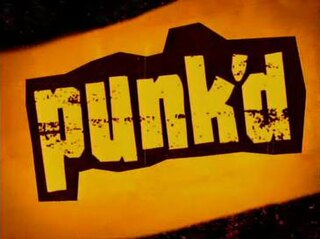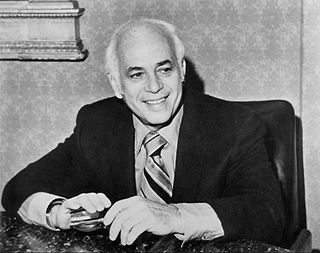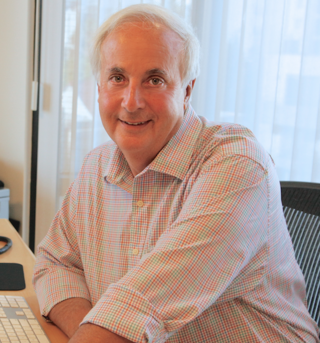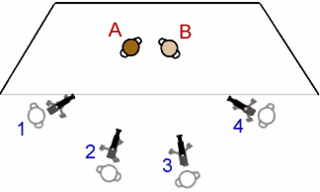Related Research Articles
Reality television is a genre of television programming that documents purportedly unscripted real-life situations, often starring unfamiliar people rather than professional actors. Reality television emerged as a distinct genre in the early 1990s with shows such as The Real World, then achieved prominence in the early 2000s with the success of the series Survivor, Idol, and Big Brother, all of which became global franchises. Reality television shows tend to be interspersed with "confessionals", short interview segments in which cast members reflect on or provide context for the events being depicted on-screen; this is most commonly seen in American reality television. Competition-based reality shows typically feature the gradual elimination of participants, either by a panel of judges, by the viewership of the show, or by the contestants themselves.

Candid Camera is an American hidden camera reality television series, with versions of the show appearing on television from 1948 until 2014. Originally created and produced by Allen Funt, it often featured practical jokes, and initially began on radio as The Candid Microphone on June 28, 1947.

Punk'd is an American hidden camera–practical joke reality television series that first aired on MTV in 2003. It was created by Ashton Kutcher and Jason Goldberg, with Kutcher serving as producer and host. It bears a resemblance to both the classic hidden camera show Candid Camera and to TV's Bloopers & Practical Jokes, which also featured pranks on celebrities. Being "punk'd" referred to being the victim of such a prank. New episodes hosted by King Bach and DeStorm Power aired on BET.

Allen Albert Funt was an American television producer, director, writer and television personality, best known as the creator and host of Candid Camera from the 1940s to 1980s, as either a regular television show or a television series of specials. Its most notable run was from 1960 to 1967 on CBS.

Peter Funt is an American actor, host, and producer for the hit TV show Candid Camera. He worked for Denver radio station KHOW, the ABC Radio Network, The New York Times and various other media organizations. He is a University of Denver graduate.

A hidden camera or spy camera is a camera used to photograph or record subjects, often people, without their knowledge. The camera may be considered "hidden" because it is not visible to the subject being filmed, or is disguised as another object. Hidden cameras are often considered a surveillance tool.

Larry Hovis was an American singer and actor best known for the 1960s television sitcom Hogan's Heroes.

Just for Laughs Gags is a Canadian silent comedy/hidden camera reality television series that is under the Just for Laughs brand created by Pierre Girard and Jacques Chevalier.
Dateline NBC is a weekly American television news magazine reality legal show that is broadcast on NBC. It was previously the network's flagship general interest news magazine, but now focuses mainly on true crime stories with only occasional editions that focus on other topics. The program airs Fridays at 10:00 p.m. Eastern Time. Special weekend encore editions also air at 9 or 10:00 p.m.. One or two-hour feature-length editions sometimes air on any given scheduled evening, often to fill vacancies in the primetime schedule on the program's respective nights due to program cancellations. In February 2021, the program aired its first ever docuseries, "The Widower", a five-hour true crime saga about a man who married six women, four of whom died.

The Ellen DeGeneres Show is an American first-run syndicated talk show that was hosted by Ellen DeGeneres. The show ran for nineteen seasons from September 8, 2003, to May 26, 2022, in which it broadcast 3,339 episodes. It was produced by Telepictures Productions. The majority of stations owned by NBC Owned Television Stations, along with Hearst Television and Tegna, served as the program's largest affiliate base. For its first five seasons, the show was taped in Studio 11 at NBC Studios in Burbank, California. From season 6 onwards, the show moved to being taped at Stage 1 on the nearby Warner Bros. lot. Since the beginning of the sixth season, The Ellen DeGeneres Show was broadcast in high definition.

What Do You Say to a Naked Lady? is a 1970 American hidden-camera style reality film directed by Candid Camera creator Allen Funt. In the film, Funt secretly records people's reactions to unexpected encounters with nudity or sexuality in unusual situations.

Vincent John "Vin" Di Bona is an American television producer of the television shows MacGyver, Entertainment Tonight, America's Funniest Home Videos and Dancing with the Stars. He runs an eponymous production company called Vin Di Bona Productions. In 2010, Di Bona launched a second business, FishBowl Worldwide Media, an independent production company developing properties for film, television, digital platforms and brands.
Cops is an American reality legal television documentary programming series that is currently in its 36th season. It is produced by Langley Productions and premiered on the Fox network on March 11, 1989. The series, known for chronicling the lives of law enforcement officials, follows police officers and sheriff's deputies, sometimes backed up by state police or other state agencies, during patrol, calls for service, and other police activities including prostitution and narcotic stings, and occasionally the serving of search and arrest warrants at criminal residences. Some episodes have also featured federal agencies. The show's formula follows the cinéma vérité convention, which does not consist of any narration, scripted dialogue, incidental music or added sound effects, depending entirely on the commentary of the officers and on the actions of the people with whom they come into contact, giving the audience a fly on the wall point of view. Each episode typically consists of three self-contained segments which often end with one or more arrests.
The Super Mario Bros. Super Show! is an American live-action/animated television series that aired from 4 September to 1 December 1989, in syndication. The series is based on the video games Super Mario Bros. and Super Mario Bros. 2 by Nintendo, and is the first of three television series to be based upon the Mario video game series. The animation was provided by South Korean company Sei Young Animation.
Steve Skrovan is an American producer, writer, director and television host.

The Garry Moore Show is the name for several separate American variety series on the CBS television network in the 1950s and 1960s. Hosted by experienced radio performer Garry Moore, the series helped launch the careers of many comedic talents, such as Dorothy Loudon, Don Adams, George Gobel, Carol Burnett, Don Knotts, Lee Goodman, James Kirkwood, Jr., Lily Tomlin, and Jonathan Winters. The Garry Moore Show garnered a number of Emmy nominations and wins.

The multiple-camera setup, multiple-camera mode of production, multi-camera or simply multicam is a method of filmmaking, television production and video production. Several cameras—either film or professional video cameras—are employed on the set and simultaneously record or broadcast a scene. It is often contrasted with a single-camera setup, which uses one camera.

TV's Bloopers & Practical Jokes is an American television program. Debuting as a weekly series, new episodes have been broadcast as infrequent specials during most of its run. It premiered on NBC in 1984, moved to ABC in 1998, and was revived in syndication in 2012. The NBC run of the series was co-produced by Carson Productions and Dick Clark Productions, and the ABC and syndication runs have been produced solely by Dick Clark Productions.
Put Him in Bucca was an Iraqi television program airing on the network Al-Baghdadia TV. It was hosted by Ali al-Khalidi. The show's name is a reference to Camp Bucca, an American-built detention facility near Umm Qasr that was in operation from 2003 until 2009.
The Candid Microphone is an American radio program that was broadcast on ABC from June 28, 1947, until September 23, 1948, and on CBS from June 6, 1950, until August 29, 1950. It was adapted for television as Candid Camera. It used "secretly recorded conversations of all kinds of people as they react in real life to all kinds of situations." The New York Times described the show as "what amounts to a huge practical joke".
References
- ↑ Totally Hidden Video at IMDb
- ↑ "Fox's "Totally Hidden Video" makes big splash in the Nielsens". Wilmington Morning Star. 12 July 1989. Retrieved 11 September 2012.
- 1 2 3 O'Connor, John J. (12 July 1989). "Review/Television; Allen Funt Calls 'Totally Hidden Video'". New York Times. Retrieved 11 September 2012.
- 1 2 Hodges, Ann (13 July 1989). "Fox exposes phony segments on its 'Totally Hidden Video'". Houston Chronicle. Archived from the original on 20 January 2013. Retrieved 11 September 2012.
- 1 2 "Fox Fires Coproducer Of 'Totally Hidden Video'". Chicago Tribune. 13 July 1989. Retrieved 11 September 2012.
- ↑ Kogan, Rick (10 July 1989). "A Nastier 'Candid Camera': 'Hidden Video' Gets Laughs At The Expense Of The Unsuspecting". Chicago Tribune. Retrieved 11 September 2012.
- ↑ tvguide.com (11 September 2012)
- ↑ Buck, Jerry (13 July 1989). "'HIDDEN VIDEO' BOLSTERS FOX". Deseret News. Archived from the original on March 4, 2016. Retrieved 11 September 2012.
- ↑ "Producer of "Totally Hidden Video" fired by Fox for staging segments". The Modesto Bee. 13 July 1989. Archived from the original on 24 January 2013. Retrieved 11 September 2012.